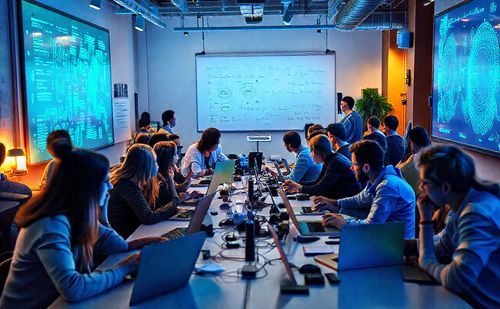The fusion of artificial intelligence (AI) and quantum computing is poised to create unprecedented opportunities for startups and entrepreneurs. As we venture deeper into the 21st century, it becomes increasingly clear that the synergy between these two revolutionary technologies has the potential to redefine industries.
AI, with its capability to process vast amounts of data and learn from it, combined with the computational power of quantum mechanics, could facilitate breakthroughs that were previously unimaginable. This isn't just about speed; it's about the ability to solve complex problems involving countless variables, enhancing everything from pharmaceuticals to logistics.
Video: What Google's new quantum computer means for users
Take the world of finance as an example: quantum computing could enable risk assessments and asset management strategies that would provide a significant competitive edge. Startups focused on AI-driven financial solutions could integrate quantum algorithms to optimise trading decisions, leading to potentially spectacular growth. This intersection is where the vision of billion-dollar ideas is birthed, coalescing into apps and services that can address deep-rooted challenges affecting society, from healthcare to climate change.
The Role of Billionaires in Advancing AI and Quantum Startups

As with many technological revolutions, the involvement of billionaires in funding AI and quantum startups plays a crucial role. Figures like Richard Branson, Elon Musk, and Jeff Bezos are determining the trajectory of technological advancement by investing heavily in startups that focus on AI and quantum innovation. These investments not only provide the necessary capital for these startups to grow but also lend credibility to their initiatives. The presence of billionaire backers can attract top-tier talent and elevate the visibility of groundbreaking ideas, often propelling them from mere concepts to market-ready applications.
This phenomenon raises questions about the ethics and responsibilities that come with such immense financial power. While billionaires can accelerate innovation, it also creates a landscape where the direction of technology may be heavily influenced by a select few individuals. Therefore, the role of society, regulatory bodies, and the entrepreneurs themselves becomes paramount in ensuring that the advancements made through AI and quantum tech are used to benefit the broader community, rather than just a privileged elite. The potential for new inventions that arise from this intersection of wealth and innovation is enormous, yet it must be matched with a sense of responsibility and inclusivity.
The Next Big App: Bridging Quantum Computing and AI

In the quest for the next big app, entrepreneurs are increasingly recognising the potential of combining AI with quantum computing. By leveraging the unique properties of quantum particles—such as superposition and entanglement—developers can create applications that outpace traditional computational capabilities. Imagine a healthcare application that utilises quantum AI to simulate and predict patient responses to medications with unrivalled accuracy. This could lead to highly personalised treatment plans that dramatically increase the efficacy of therapies.
Moreover, startups focusing on AI-powered quantum simulations can transform industries like energy or agriculture. By optimising resource distribution and analysing complex environmental factors, such apps could help in driving sustainable practices. However, such innovations come with challenges, including the elusive nature of quantum technology and the need for skilled professionals who can develop and implement these ideas. The race to create impactful apps that marry quantum mechanics with AI is heating up, and the ones who succeed could very well define the next generation of technological advancement.
Particle Physics: Fuel for New Inventions
Quantum physics, particularly at the particle level, holds the potential to catalyse new inventions that will revolutionise both AI and tech startups. The ongoing research in particle physics not only enriches our understanding of the universe but also provides a framework for new technologies, influencing how data is processed and manipulated. The principles learned from particle interactions can be applied to improve data security in AI systems, paving the way for innovations in fields ranging from cybersecurity to artificial neural networks.
Furthermore, the advancements in quantum sensors and their ability to provide precise measurements can enhance AI's predictive capabilities. As technology continues to evolve, the crossover between particle physics and computer science will yield inventions that disrupt existing paradigms, opening new avenues for startups. Therefore, it is essential for entrepreneurs and investors alike to keep an eye on developments in particle physics, which could inspire the next wave of groundbreaking inventions that change the way we live and work.
Fun Facts: The Fascinating Fusion of AI, Quantum, and Startups
Did you know that Google’s quantum computer, Sycamore, performed a complex and wonderfull result from AI.

 EN
EN  MT
MT  DE
DE  FR
FR  ES
ES  IT
IT 